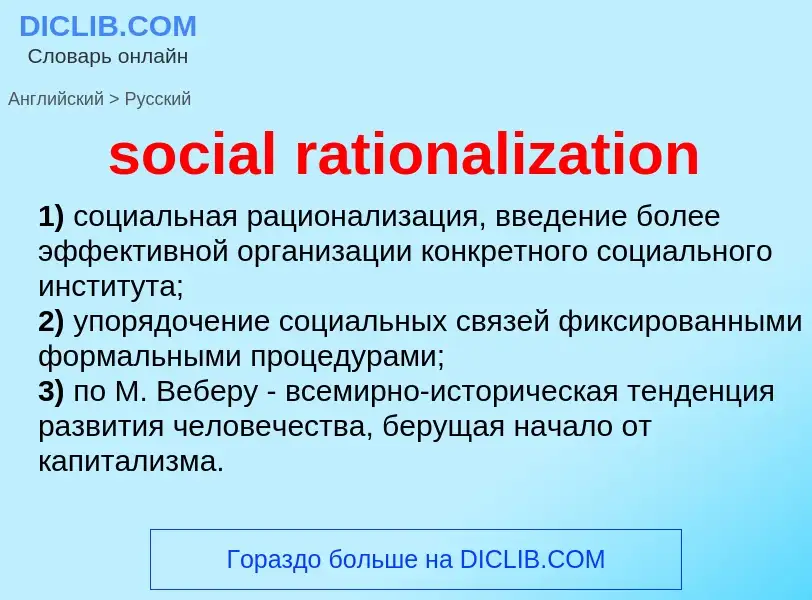Перевод и анализ слов искусственным интеллектом ChatGPT
На этой странице Вы можете получить подробный анализ слова или словосочетания, произведенный с помощью лучшей на сегодняшний день технологии искусственного интеллекта:
- как употребляется слово
- частота употребления
- используется оно чаще в устной или письменной речи
- варианты перевода слова
- примеры употребления (несколько фраз с переводом)
- этимология
social rationalization - перевод на русский
['ræʃ(ə)nəlaiz]
общая лексика
рационализировать
глагол
общая лексика
давать разумное объяснение (чего-л.)
логически обосновывать
объяснять рационалистически
объяснять (свои поступки, желания и т. п.)
пытаться дать объяснение (часто не соответствующее истине)
рационализировать
давать рационалистическое объяснение
математика
освобождаться от иррациональностей
рационализовать
приводить к рациональному виду
освобождать от иррациональностей
[ræʃ(ə)nəlai'zeiʃ(ə)n]
общая лексика
освобождение от иррациональностей
рационализация
Смотрите также
существительное
общая лексика
разумное объяснение
логическое обоснование
рационалистическое объяснение
психология
рационализация
объяснение намерений и поступков задним числом (при непонимании их истинных мотивов)
математика
освобождение от иррациональностей
приведение к рациональному виду
синоним
этология
социальная связь
Определение
---
(СДПГ) , создана в 1869 на общегерманском рабочем съезде в Эйзенахе (руководители - В. Либкнехт и А. Бебель). В партии шла острая борьба между течениями [с нач. 20 в. три: ревизионистское, или правое (Э. Бернштейн, К. Легин, Ф. Эберт, Ф. Шейдеман, Г. Мюллер), центристское (К. Каутский, после 1910) и левое (К. Либкнехт, Р. Люксембург, К. Цеткин, Ф. Меринг, В. Пик), на основе которого образована в декабре 1918 КПГ. Находилась вне закона в 1878-90 и во время фашистской диктатуры (1933-45).
Википедия
Democratic rationalization is term used by Andrew Feenberg in his article "Subversive Rationalization: Technology, Power and Democracy with technology." Feenberg argues against the idea of technological determinism citing flaws in its two fundamental theses. The first is the thesis of unilinear progress. This is the belief that technological progress follows a direct and predictable path from lower to higher levels of complexity and that each stage along this path is necessary for progress to occur (Feenberg 211).
The second is the thesis of determination by the base. This is the concept that in a society where a technology had been introduced, that society must organize itself or adapt to the technology (Feenberg 211). In his argument against the former thesis Feenberg says that constructivist studies of technology will lead us to realize that there is not a set path by which development of technologies occur but rather an emerging of similar technologies at the same time leading to a multiplicity of choices. These choices are made based upon certain social factors and upon examining them we will see that they are not deterministic in nature (Feenberg 212).
Arguing against the latter thesis, Feenberg calls to our attention social reforms that have been mandated by governments mainly in regards to the protection of its citizens and laborers. Most of the time these mandates are widely accepted after being passed through the governing body. At which point technology and industry will reform and re-evolve to meet the new standards in a way that has greater efficiency than it did so previously (Feenberg 214)

![Housing project in [[Bremen-Vahr]] in the 1960s, back then most tenants living in housing-projects were two-parent families with at least one parent working. In many housing projects, the composition of tenants has changed since then and now many tenant-families are headed by a single female or an unemployed male Housing project in [[Bremen-Vahr]] in the 1960s, back then most tenants living in housing-projects were two-parent families with at least one parent working. In many housing projects, the composition of tenants has changed since then and now many tenant-families are headed by a single female or an unemployed male](https://commons.wikimedia.org/wiki/Special:FilePath/Bundesarchiv B 145 Bild-F008854-0004, Bremen-Vahr, Neubaugebiet.jpg?width=200)
